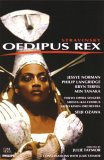 Oedipus Rex - Stravinsky | DVD | (13/06/2005)
from £N/A
| Saving you £N/A (N/A%)
| RRP
Oedipus Rex - Stravinsky | DVD | (13/06/2005)
from £N/A
| Saving you £N/A (N/A%)
| RRP Opera-oratorio in two acts. Poem after Sophocles by Jean Cocteau.
![Monteverdi: L'Incoronazione di Poppea [1993]](/pictures/1027573.jpg) Monteverdi: L'Incoronazione di Poppea | DVD | (04/12/2000)
from £2.96
| Saving you £23.29 (1,370.00%)
| RRP
Monteverdi: L'Incoronazione di Poppea | DVD | (04/12/2000)
from £2.96
| Saving you £23.29 (1,370.00%)
| RRP Monteverdi's L'Incoronazione di Poppea (1642) marks one of the very foundations of opera. Revolving around real historical characters, the Roman emperor Nero, his love for Poppea, the betrayal of the empress Octavia, and death of the philosopher Seneca, Monteverdi pits human love, ambition and intrigue against the fates. The set, a symbolic part-globe, and the costumes drawn from various ages suggest--very much in the way of the surreal film of Shakespeare's Titus (1999)--that the concerns of ancient Rome are timeless. With the emphasis on the text (the music alone does not hold the attention for 150 minutes) conductor Jacobs depends upon an excellent cast to bring the production alive. Patricia Schumann dominates the stage, her Poppea is warm, sensual and likeable, without being entirely trustworthy, an effective counterpart to Richard Croft's Nero. Darla Brooks brings just the right degree of vivacious gullibility to Drusilla, while Curtis Ryam offers eccentric comedy as Arnalta. As Ottone Jeffrey Gall is a man acutely tormented by love. Recorded at the 1993 Schwetzinger Festspiele, there is no sign of an audience, the many close-ups suggesting this performance was specially given for video. On the DVD: There are subtitle options for English, French and German, but no special features. The booklet is well documented but does not contain the libretto. The sound is good PCM stereo while the 4:3 image (not 16:9 as stated on the packaging) is better than video but otherwise unremarkable. --Gary S. Dalkin
![Weill: Aufsteig und Fall der Stadt Mahagonny [1998]](/pictures/1028714.jpg) Weill: Aufsteig und Fall der Stadt Mahagonny | DVD | (30/01/2001)
from £33.73
| Saving you £-8.74 (N/A%)
| RRP
Weill: Aufsteig und Fall der Stadt Mahagonny | DVD | (30/01/2001)
from £33.73
| Saving you £-8.74 (N/A%)
| RRP Kurt Weill's complex score reigns supreme in Peter Zadek's 1998 Salzburg Festival staging of The Rise and Fall of the City of Mahagonny, the collaboration with Brecht which became a target for Nazi insurrection on its 1930 premiere. The city itself is suggested by the attitudes and personalities of the singers rather than by Richard Peduzzi's Spartan sets. It's bleak stuff in many ways, not least in its vision of the human state: squaring up to corruption is a lonely and fatal business. But thanks to Weill's musical eclecticism, which ranges from barbershop to lieder, there are moments of intense beauty, not least in the duets between lumberjack Jimmy Mahoney and prostitute Jenny. There are, too, flashes which anticipate Weill's American future on Broadway. The lilting "Alabama Song", that gift to every would-be cabaret artist in search of a Lotte Lenya moment, works wonderfully as an ensemble piece. Despite occasional inaudibility, the singing is often breathtaking. Gwyneth Jones is a majestic Begbick, Catherine Maltifano's voluptuous and earthy Jenny also has a rarely seen sweetness and Jerry Hadley's Jimmy Mahoney is ultimately almost unbearably moving. Food for thought, indeed. On the DVD: The Rise and Fall of the City of Mahagonny is presented in 16:9 picture format, but would have benefited from the scale of a widescreen treatment. It can be difficult to keep track of everything that's going on. The cavernous stage is probably responsible for the acoustics which sometimes allow the orchestra to overwhelm the singing, otherwise well served by the PCM stereo sound. There are no DVD extras but the excellent booklet and production notes are welcome.--Piers Ford

Please wait. Loading...
This site uses cookies.
More details in our privacy policy